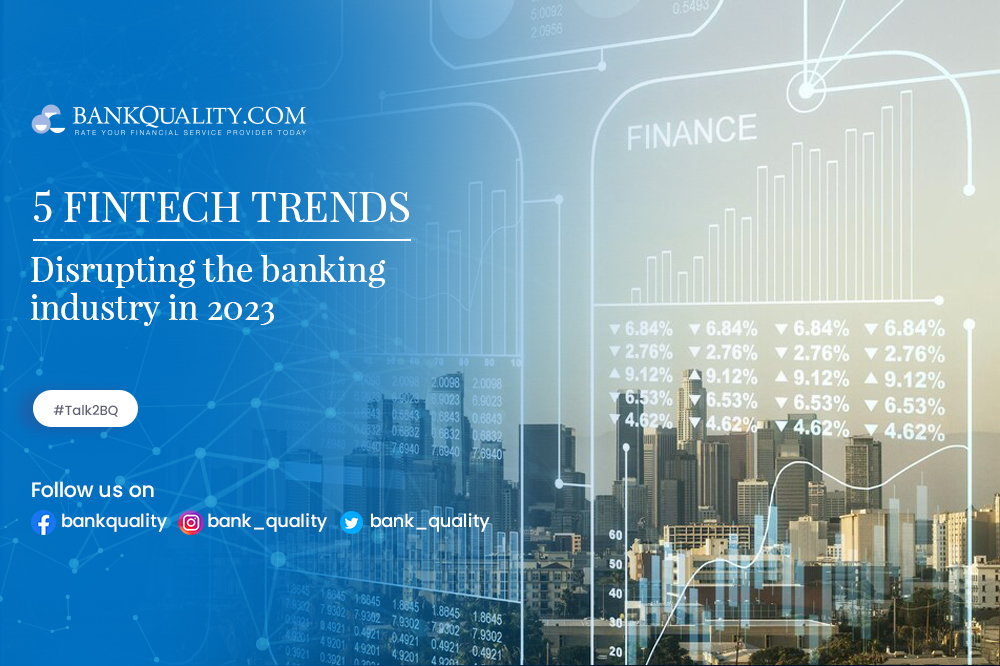

The global fintech market has reached more than $ 194.1 billion in 2022 and is expected to hit $492.81 billion by 2023-2028, growing at a compound annual growth rate of 19.8%
Speed, efficiency and innovation are critical for banks as customers want modern, accessible and affordable financial services right at their fingertips. The sophistication and innovation of fintech services are the key ingredients needed by citizens of the future. This forces traditional systems to adapt and offer ingenious new solutions for customers and startups.
As competition and improvements continue to increase, many advanced technologies have permeated the world of financial services, reshaping it in significant ways. But, which fintech trends will change the future of banking?
Let us take a look at five financial technology trends that will shape the landscape of banking in 2023.
Open Banking
The concept of Open Banking changes the dynamics of interaction between banks and customers. By enabling customers to securely share their financial data with banks, third-party providers and other financial institutions (FIs). Open Banking makes it easier for banks to deliver personalised services, enhanced products and tailored experiences to their customers.
Open banking is making an impact on the market by creating a more competitive environment for banks and FIs, which allows customers to share their financial data with a variety of providers, which in turn gives banks and FIs access to more data than ever before.
Blockchain, AI and machine learning are of great benefit to financial platforms
Domination of artificial intelligence and machine learning
The banking industry has entered a new phase of digital advancement, with banks and financial institutions embracing the power of artificial intelligence (AI). This technological evolution has revolutionised the quality of products and services offered by banks, resulting in improved data processing, enhanced customer experience, and more efficient traditional processes.
With the availability and innovation of AI and machine learning (ML) technologies, data has become the most valuable asset for financial services organisations. Advanced AI-powered innovations such as chatbots, fraud detection and prevention, predictive analysis using ML, and AI in credit risk management are set to have a significant impact on the banking industry.
Embedded Finance
Embedded finance enables businesses to offer financial services such as lending, payment acceptance, and insurance without the need to redirect customers to traditional FIs, thus providing faster and more convenient financial solutions for both consumers and organisations that require quick payment processing.
Out of various types of embedded finance, buy now, pay later (BNPL) stands out as a rapidly expanding sector that provides customers with the convenience of paying for purchases at a later date, typically by dividing the total cost into several instalments.
Due to the slow production of accountants and financial professionals, compared to the demand from the business industry, companies are resorting to these tools to enhance the efficiency and productivity of their workforce.
Emergence of RegTech
RegTech has become a notable subcategory in the fintech industry, helping FIs such as banks and credit unions through innovative technologies such as AI, blockchain, ML and automation. Its main goal is to solve problems, improve operations and mitigate regulatory risks related to compliance requirements.
The latest research study shows that the global RegTech market was worth around $5.31 billion in 2019. Based on current forecasts, this market will have a compound annual growth rate (CAGR) of 21.27% and will exceed $33.1 billion by 2026.
Digital technology speeds up processes and enables financial management
Cryptocurrency banking
Customers and businesses are increasingly inclined towards utilising digital technology to manage their financial requirements, causing a transformation in the financial sector. In response, FIs provide a range of digital solutions, such as mobile cheque deposits and digital wallets, to cater to changing consumer preferences. However, concerning cryptocurrency, FIs are presently failing to meet the demands of their customers.
With various approaches, banks are adopting cryptocurrencies, making them a potentially lucrative investment. While financial institutions may harbour doubts about cryptocurrency due to perceived risks and extensive due diligence requirements, these assets can bring numerous advantages to both banks and their clients.